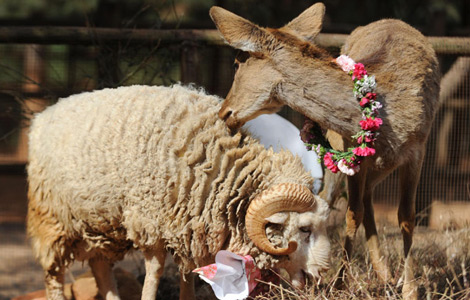China to deepen agricultural co-op with US
Updated: 2012-02-12 16:59
(Xinhua)
|
|||||||||||
BEIJING - The agricultural ministries of China and the United States will further enhance agricultural exchanges and cooperation, deepening mutual understanding and trust, so as to achieve mutually beneficial development in the future, said Minister of Agriculture Han Changfu on Sunday.
Han made the remarks in an interview with Xinhua prior to Chinese Vice-President Xi Jinping's visit to the United States.
Agriculture was one of the first areas in which China and the United States began to cooperate, as the two are both large nations of agricultural production, trade and consumption and viewed agriculture as a strategic and basic industry, said Han.
After 30 years development, China-US agricultural cooperation has laid a solid foundation, with extensive exchanges and cooperation at all levels, the minister said.
According to Han, the agricultural ministries of both countries will push forward cooperation in the areas of food security, sustainable development, agricultural trade and science and technology, creating opportunities for cooperation between agricultural enterprises of the two countries and promoting joint research on agriculture.
He believes that, with the deepening of agricultural cooperation and the increasing openness of agricultural trade and investment, bilateral agricultural cooperation will have broader prospects.
EFFECTIVE AGRICULTURAL SCIENCE AND TECHNOLOGY COOPERATION
It will help improving the agricultural science and technology strength of both nations if China and the United States enhance their cooperation, he argued.
China and the United States have conducted effective cooperation in crop plantation, stock raising, fishery, agricultural research and education, agricultural product processing and circulation, he explained.
The two nations have launched more than 500 science and technology exchange programs since they established the working group on agricultural science and technology cooperation in 1980, with around 3,000 experts get involved.
FAST GROWTH IN AGRICULTURAL TRADE
Han said the fast growth of bilateral agricultural trade has greatly promoted the industrial restructuring of agriculture and made agricultural produce more abundant for the two countries.
Bilateral agricultural trade volume has increased to $24.5 billion from 4.1 $billion during 2001 to 2010, with an average annual growth of 22 percent, according to official statistics.
In 2010, China imported $18.6 billion-worth of agricultural produce from the United States. This accounted for 13 percent of the United States' total agricultural exports, said Han, noting China has become the main destination for US agricultural exports.
In the same year, China exported $5.8 billion-worth of agricultural produce to the United States, 12 percent of its total exports in the area. The United States is the third-biggest recipient of Chinese agricultural exports.
INCREASED COOPERATION ON AGRICULTURAL INVESTMENT
Han paid great attention to the expansion and reinforcement of bilateral agricultural investment cooperation, noting enterprises are the main driving forces for the development of bilateral agricultural trade.
The minister noted that a great number of US enterprises have invested in agriculture in China. From crop-plantation to machinery and sales, these investments have gained remarkable economic benefit.
Foreign investment also introduced advanced technology and management to China, which promoted the upgrading of its agricultural industry.
Chinese investments in US agriculture have also increased in recent years, with growing desire from Chinese enterprises to invest abroad, according to Han.
He called on China and the United States to jointly promote investment cooperation between enterprises of the two countries in the areas of technology application and sustainable development, and create a good atmosphere for developing bilateral agricultural trade relations.
Hot Topics
Kim Jong-il, Mengniu, train crash probe, Vaclav Havel, New Year, coast guard death, Internet security, Mekong River, Strait of Hormuz, economic work conference
Editor's Picks

|

|

|

|

|

|







